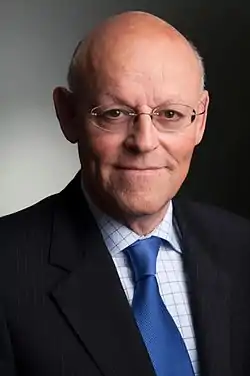Uriël "Uri" Rosenthal (Dutch pronunciation: [ˈuri ˈroːzəntaːl]; born 19 July 1945) is a retired Dutch politician of the People's Party for Freedom and Democracy (VVD) and political scientist.
Rosenthal a political scientist by occupation, was elected as a Member of the Senate on 8 June 1999 after the Senate election of 1999. On 5 May 2005 he was selected as the parliamentary leader of the People's Party for Freedom and Democracy in the Senate. Following the election of 2010 Rosenthal was asked to become Minister of Foreign Affairs in the Cabinet Rutte–Verhagen Rosenthal accepted and resigned as parliamentary leader in the Senate and a Member of the Senate the same day he took office as the new Minister of Foreign Affairs on 14 October 2010 serving until 5 November 2012.
A professor of political science and public administration by occupation, he taught from 1980 until 2010 at the Erasmus University Rotterdam and Leiden University.
Early life
Uriël Rosenthal was born on 19 July 1945 in Montreux, Switzerland to Jewish parents who during World War II fled the Netherlands from the German occupation of the Netherlands. They returned to the Netherlands shortly after the war ended. After attending school in The Hague, he went to study political science at the University of Amsterdam, where he obtained a Bachelor of Social Science and a Master of Social Science in 1970. In 1978 he received his Doctor of Philosophy in social sciences at the Erasmus University Rotterdam. In 1980 he became a professor of political science and public administration at the Erasmus University Rotterdam. From 1987 until 2011 he was a professor of public administration at the Leiden University.
Politics
He was elected Member of the Senate as a member of the People's Party for Freedom and Democracy and took office on 8 June 1999. He became the Parliamentary leader in the Senate on 5 May 2005. On 12 June 2010 Queen Beatrix nominated Rosenthal as first informateur in the 2010 Dutch cabinet formation.[1] On 26 June the Queen replaced Rosenthal with Herman Tjeenk Willink, the Vice President of the Council of State as the new informateur.[2] On 5 July he became informateur a second time together with Jacques Wallage of the Labour Party.[3] But on 21 July the Queen again replaced him and Wallage with Minister of State and former Prime Minister Ruud Lubbers.

On 28 September 2010 the negotiations were finished. A coalition agreement was reached between People's Party for Freedom and Democracy and Christian Democratic Appeal to form a minority coalition, supported by the Party for Freedom to obtain a majority. Formateur Mark Rutte asked Rosenthal as the Minister of Foreign Affairs in the new cabinet. Because a member of the States-General of the Netherlands can not serve in the cabinet he resigned as a Member of the Senate and Parliamentary leader on 14 October 2010, the same day he took office as the new Minister of Foreign Affairs.[4]
As of 1 March 2013, Rosenthal is chairman of the Policy Advisory Council on Science and Technology (AWT).
He has been nominated by the Dutch Government to serve as the Special Envoy for the fourth International Cyberspace Conference to be held in 2015.[5]
Family
He has been married since 4 January 1973. He lives in Rotterdam with his wife, Dinah, and their two children. Dinah Rosenthal is an Israeli native, originally from Haifa. Two of Rosenthal's sisters live in Israel.[6][7]
Decorations
| Honours | ||||
| Ribbon bar | Honour | Country | Date | Comment |
|---|---|---|---|---|
| Officer of the Order of Orange-Nassau | Netherlands | 10 December 1985 | ||
References
- ↑ (in Dutch) VVD'er Uri Rosenthal informateur Archived 2012-04-21 at the Wayback Machine, NRC, 12 June 2010
- ↑ (in English) Queen appoints new coalition negotiator, Radio Netherlands Worldwide, 26 June 2010
- ↑ (in English) Dutch coalition talks continue behind closed doors Archived 2010-07-09 at the Wayback Machine, Radio Netherlands Worldwide, 6 July 2010
- ↑ (in Dutch) Uri Rosenthal is beoogd minister Buitenlandse Zaken Archived 2011-07-20 at the Wayback Machine, NRC, 8 October 2010
- ↑ "Netherlands to host international Cyberspace Conference in 2015". Government of the Netherlands. Retrieved 20 March 2014.
- ↑ (in Dutch) D66 en PvdA eisen uitleg over Nederlandse blokkade EU-standpunt Israël, NRC, 29 September 2011
- ↑ "Uri Rosenthal: from crisis professor to Foreign Minister". Archived from the original on 2013-12-14. Retrieved 2013-12-10.
External links
- Official
- (in Dutch) Prof.Dr. U. (Uri) Rosenthal Parlement & Politiek
- (in Dutch) Prof.Dr. U. Rosenthal (VVD) Eerste Kamer der Staten-Generaal

